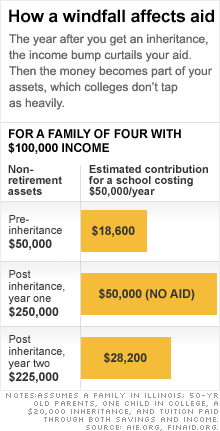NEW YORK (Money Magazine) -- Q: Our kids are 10 and 16. We expect to inherit $200,000, which we need for retirement. Can we still get financial aid for college? -- Name withheld
A: Yes -- but it'll be iffy the year after you receive the windfall.

You'll have to list the money as income on the FAFSA aid form (even though it's not counted as income on your taxes). And since the aid formulas weigh income far more heavily than assets, you'll probably be on the hook for full tuition that year.
Your best bet for snagging some bucks?
After you send your form to the schools, submit a request for a "professional judgment review." Include a brief letter to the financial aid administrator stating the inheritance is a one-time event that doesn't reflect your expected future earnings, and enclose a copy of the relevant estate paperwork, says Mark Kantrowitz, publisher of Fastweb.com and FinAid.org.
The good news is that the following year the money is considered part of your assets, which gives you a better shot at aid.
Have a question about your money? E-mail the Help Desk.
You can limit the impact a little more by fully funding a retirement account like a Roth IRA; the FAFSA formula doesn't count retirement savings.
Or use the money to cancel debt: Having a large credit card balance doesn't buy you a better aid package.
Using assets to pay it off improves both your finances and chances at aid ![]()

Carlos Rodriguez is trying to rid himself of $15,000 in credit card debt, while paying his mortgage and saving for his son's college education.
| Overnight Avg Rate | Latest | Change | Last Week |
|---|---|---|---|
| 30 yr fixed | 3.80% | 3.88% | |
| 15 yr fixed | 3.20% | 3.23% | |
| 5/1 ARM | 3.84% | 3.88% | |
| 30 yr refi | 3.82% | 3.93% | |
| 15 yr refi | 3.20% | 3.23% |
Today's featured rates: